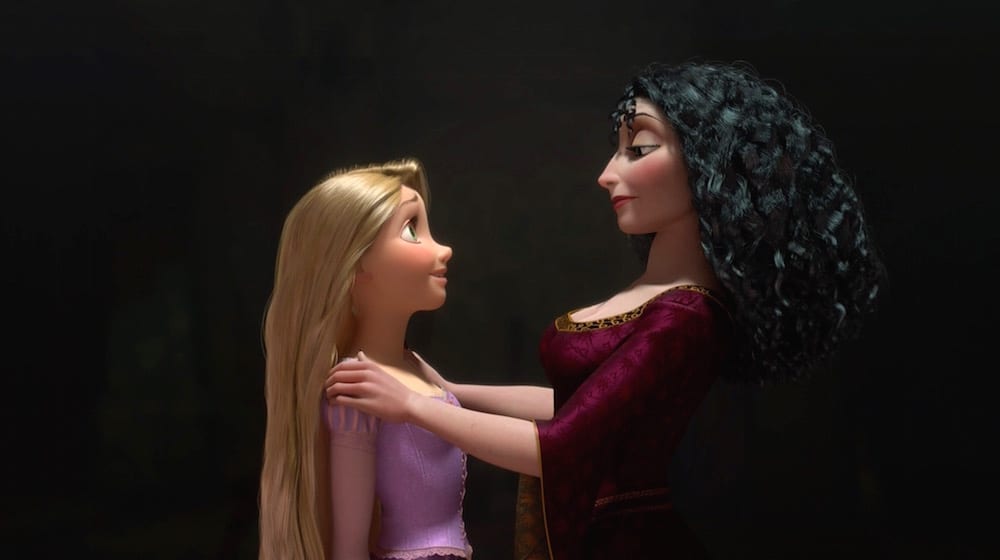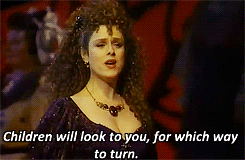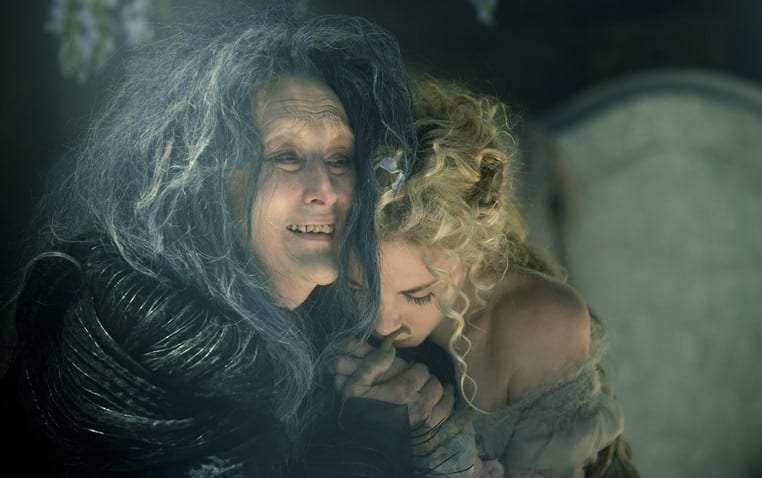On a recent Fandomentalist, we discussed fairy tales in media, given their ubiquity and staying-power. It’s hard not to immediately jump into an extended discussion about Disney films, especially in this era of live-action reboot overload. Gretchen made the observation that as time has gone on, the villains in Disney have become increasingly neutered. We go from Maleficent calling on the powers of hell, to *the patriarchy* keeping Mulan down, to Prince Hans…faking a marriage certificate and confusing a room full of diplomats.
However, I find myself increasingly drawn to Mother Gothel. Overall, Tangled was an uneven film, with somewhat forgettable music and a protagonist that blends together with Anna from Frozen so thoroughly, I can almost hear Kristen Bell saying, “I am a despicable human being!” There’s a decent TV series follow-up featuring a Dutiful Princess Rapunzel, which is somewhat worth the effort—especially for Flynn’s complete lack of entitlement surrounding their relationship—but otherwise, it wouldn’t shock me if this was a mostly overlooked Disney movie, a la The Sword and the Stone. (For good reason.)
Except for Mother Gothel. There’s no denying that she is a villain, given her abuse of Rapunzel, her penchant for murder, and the fact that her guiding motivation in life is to stay hot. But what makes her character spring off the screen is her relationship to Rapunzel. You can tell that there’s an affection there, even if perversely warped. Wt the same time, Rapunzel is surrounded by her own guilt at “rebelling” (aka taking a step towards leading a perfectly healthy adult life) and her confusion over her feelings towards her mother. When she tries to save Flynn’s life, it’s not through any physical confrontation or trick. It’s this:
“I’ll never run, I’ll never try to escape. Just let me heal him. And you and I will be together. Forever, just like you want. Everything will be the way it was. I promise. Just like you want. Just let me heal him.”
It’s appeasing a mother who can’t deal with the reality of her freedom. Granted, it’s also a mother who needs magic hair to live. But hey, the complicated parental dynamic is just as important.
The tale of Rapunzel is hardly new, but it gets at a central tension that allows for one of the best fairy tale villains: a parent’s inability to let their child grow up.

This is something that many of us deal with, though few pieces of media explore it with any sort of depth. There’s also the tendency for mothers to be painted as ideal, while fathers are given the space to be less defined by their parent-status. Step-mothers are allowed to be evil, sure, just like in the case of Rapunzel. While these implications are not not exactly charming, with regards to their relationship and dynamic within that fairy tale, that distinction doesn’t mean much. Some versions reunite Rapunzel with her birth parents, but that doesn’t erase the years spent with the one woman who raised her as a baby.
Tangled went a bit over and beyond in some places to make sure the audience knew Gothel was a Certified Baddie, including her joking at Rapunzel’s expense. It’s not like had she been incredibly nice, the whole “locking her in a tower” thing would be erased or the relationship would be magically non-abusive, but it was a more exaggerated version of the tale when compared to others.
For instance, Stephen Sondheim’s Into the Woods is perhaps the piece of media that not only captures the true power of this fairy tale, but presents “The Witch” in possibly the most conflicted and sympathetic light. Yet somehow it doesn’t leave any space for apology with her behavior, either.
Rapunzel: You just locked me in a tower without company for fourteen years. Then blinded my prince. Then banished me to a desert where I had little to eat and again no company…and then bore twins. Because of the way you treated me, I will never, ever be happy.
The Witch: I was just trying to be a good mother.
While this is objectively ridiculous, the emotional dynamic Sondheim paints between them…it’s something realistic that is only ever-so tweaked.
The Witch doesn’t keep Rapunzel to look hot (she needs a cow for that, obviously). She keeps Rapunzel because she has a genuine affection for her. But her worldview is one of ultimate terror and black-and-white thinking. If only she could *force* Rapunzel to listen to her…children should listen, after all. Then she’d be “safe.”
“Don’t you know what’s out there in the world? Someone has to shield you from the world. Stay with me. Princes wait there in the world, it’s true. Princes, yes, but wolves at humans too. (…) Stay with me the world is dark and wild. Stay a child while you can be a child. With me.”
Even when Rapunzel rightfully points out that she was lonely and should be able to see the outside world, the response of The Witch is a guilt-trip. It’s what you might hear an overbearing friend’s mother say when they answer the phone:
The Witch: What would you have me be? Handsome like a Prince? Ah, but I am old. I am ugly. I embarrass you.
Rapunzel: No!
The Witch: You are ashamed of me.
Rapunzel: No!
The Witch: You are ashamed. You don’t understand.
Rapunzel: It was lonely atop that tower.
The Witch: I was not company enough?
This…this is what a mom says to a kid who wants to go to college in a different state. Yes, there’s an embellished, monstrous element to The Witch’s treatment, because that’s what makes a tale. Or makes the prince seem more heroic in some versions, perhaps. But that resistance to letting a kid grow up and the use of terror to keep them close is barely the stuff of fiction.
In fact, The Witch’s worldview is summed up best in one line:
“Children can only grow From something you love To something you lose…”
Add to this the fact that The Witch ended up being right. Rapunzel got smushed by a big tall terrible lady giant. That one fear coming true in the most concrete way possible? It shakes her core until we see her evolve into the bitter, apathetic state of “Last Midnight,” ultimately to her own demise. Perhaps it’s not as thrilling on paper as the prince freeing Rapunzel, but there’s no way in hell it’s less impactful.

Yet perhaps the most painful part of this portrayal of the fairy tale is Rapunzel herself. I’m not speaking of the pain and hardships she endures, though of course thinking about it all isn’t exactly pleasant (especially since it’s all for a prince with a wandering eye). It’s the fact that she doesn’t seem to hold any hatred for this utterly abusive, awful woman, at least not until her dressing-down speech. Instead, she’s upset that her mother thinks she’s embarrassed of her, and she’s moved by The Witch’s plea in “Stay with Me,” even if she gets banished to a swamp soon after.
Though I do think the themes of the movie adaption were significantly watered down, especially without Rapunzel’s demise, MacKenzie Mauzy’s performance opposite Meryl Streep for this number showed the deep conflict in her character, and ultimately the affection between the two women.

It’s unhealthy, of course, measurably unhealthy. But there’s no simplicity in the tale, because sometimes the people you love are the ones who hurt you. Which makes asserting your own wants and needs all the scarier. Standing up to her might never be free of complications, but it doesn’t have to be.
For Rapunzel, the consequences are disastrous in Into the Woods, and rewarding in Tangled. What matters, though, is that she tries in both. Because while her mother isn’t an evil witch of the sea or a hell-summoning sorceress-turned-dragon, she’s the kind of villain who exists in our world—a villain many have to battle each day. We need more those on our screens.

